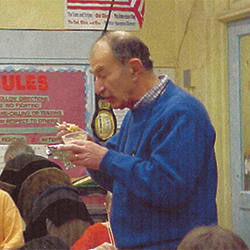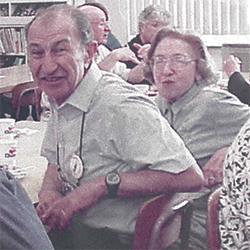Pastimes of Statisticians: What Does Gerry Hahn Like to Do When He Is Not Being a Statistician?
Who are you, and what is your statistics position?
I, Gerry Hahn, retired from what is now the GE Global Research Center in 2001, after 46 years as an applied statistician—the last 26 as manager of the Applied Statistics Program, an organization that provided support to the entire GE Company. In my early days, I worked as a statistician for an advertising agency and then for the US Army Chemical Corps—rising to the lofty rank of corporal. Today, I still dabble in statistics for a couple of hours most days, mainly writing articles and books.
With co-authors Bill Meeker and Luis Escobar, I recently completed the second edition of Statistical Intervals: A Guide for Practitioners and Researchers. Also, for the past 20 years, I have collaborated with Necip Doganaksoy and Bill Meeker on a yearly article, mostly on reliability applications, for Quality Progress’s Statistics Spotlight series. I am currently working with Necip and Bill on an introductory book, tentatively titled Achieving Product Reliability: A Key in Business Success.
In the most unlikely circumstance that any readers would like to know more, I refer them to a Quality Engineering article by Necip Doganaksoy, “A Conversation with Gerry Hahn,” published in 2009.
Tell us what you like to do for fun when you are not being a statistician.
I mentor third-graders in math at a local inner-city public school. (I originally did fourth-graders, but was demoted a few years ago). I typically work, under the direction of the classroom teacher, with two youngsters at a time, but meet singly with some of the more challenging kids. This way, and by coming to school for a few hours once a week, I typically cover the entire class every two weeks.
Teachers do a great job instructing large classes of kids with a great diversity of abilities, motivation, and home encouragement.
Understandably, the major emphasis tends to be on the youngsters who need help most—to the detriment, at times, of the higher achievers, who are liable to get bored and possibly even turned off from learning. Thus, one of the key benefits of individualized mentoring is it can be targeted at an appropriate level for each child. Thus, I might review the basics of subtraction with one group and two-step “word problems” with the next.
What drew you to this hobby, and what keeps you interested?
When I retired from GE in 2001, I found myself in an unusual situation. After an active professional career while, with Bea, raising three daughters, I now had some spare time. I regard time as my most valuable possession and want to spend it as wisely as possible. But what to select from among the immense array of opportunities this world provides us? Regrettably, I do not have the talent of my former colleagues Fred Faltin (researching, finding, and photographing ghost towns) and Wayne Nelson (doing the Argentine tango).
My criteria for selecting a hobby are that it be doable, fun, challenging, and—at least in some small way—beneficial to society. At first, I thought of learning to play the piano. But I soon realized that—although this hobby would surely be challenging—it was, given my lack of talent, not very doable, likely to be frustrating, and certainly not beneficial to society. Most fortunately, I was invited to participate in the local school mentoring program being spearheaded by my synagogue’s Social Action Committee around that time. This appeared to meet my criteria—as it, indeed, did—and I agreed eagerly.
The benefits of mentoring youngsters in our schools, moreover, is not all academic. It provides kids the personalized attention on which they thrive, especially the many who come from one-parent homes.
Mentoring youngsters also presents a significant intellectual challenge—especially for those of you, like me, without a formal teaching background—to find ways of maintaining interest while still providing a valuable learning experience. It also can give much personal satisfaction—like the thrill of walking into a classroom to see a bunch of eager kids vying to work with you. Or watching youngsters grow and develop.
Do you, dear reader, get the feeling I am trying to sell you on taking a shot at mentoring in your community? You bet I am! You can provide our dedicated and hard-working teachers a helping hand, enrich some future citizens’ knowledge base and self-esteem, and have a great time doing it all. As long as you love children and like to contribute to their advancement, have an hour to spare during school, and have a reasonable amount of patience, you too can contribute. And, most likely, all you need to get started is a phone call to a local school. It’s a win-win proposition. So, give it a try! After all, the world already has an ample supply of proficient pianists.



















